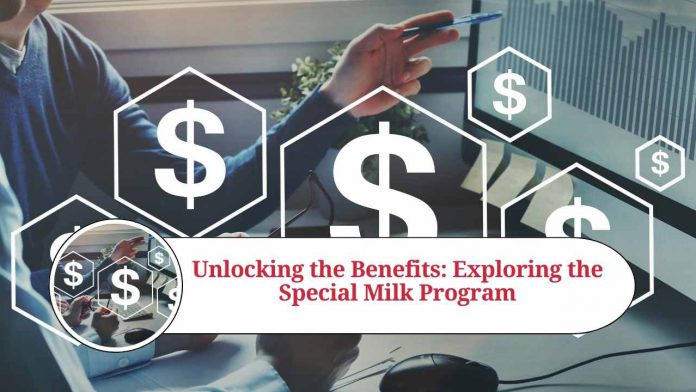Introduction:
In a world where proper nutrition is crucial for children’s growth and development, initiatives like the Special Milk Program play a vital role in ensuring that every child has access to wholesome milk. The Special Milk Program, a federal assistance program in the United States, aims to provide milk to children in schools, childcare institutions, and summer camps who may not otherwise have access to it. Let’s dive deeper into the program and explore its significance in nurturing the health and well-being of young individuals.
Understanding the Special Milk Program:
The Special Milk Program, administered by the United States Department of Agriculture (USDA), was established to provide milk to children in participating educational and childcare institutions. The program primarily targets those institutions that do not participate in other federal meal service programs, such as the National School Lunch Program or the School Breakfast Program.
Objectives and Benefits:
The primary objective of the Special Milk Program is to ensure that children receive adequate amounts of milk and other dairy products, which are crucial for their growth and development. By offering milk at a reduced price or free of charge, the program aims to improve the nutritional intake of children from low-income families.
The benefits of the Special Milk Program are manifold. Firstly, milk is a valuable source of essential nutrients, including calcium, protein, vitamins, and minerals, which are vital for the development of strong bones, teeth, and overall physical well-being. By making milk accessible, the program helps combat nutrient deficiencies and supports healthy growth.
Secondly, the Special Milk Program promotes equality in education by removing the financial barrier that may prevent some children from enjoying the same opportunities as their peers. By ensuring that children have access to milk, regardless of their economic background, the program fosters an inclusive environment and sets the stage for academic success.
Implementation and Eligibility:
The Special Milk Program operates through agreements between the USDA and participating institutions. These institutions include schools, childcare centers, summer camps, and other nonprofit organizations that cater to young children. While the program primarily focuses on serving children up to the age of 18, it can also extend its benefits to adults with disabilities who are enrolled in participating institutions.
Eligibility for the Special Milk Program is based on the economic needs of the children or the institution. Institutions determine eligibility by using income eligibility guidelines set by the USDA. Children from families with incomes below the eligibility threshold can receive milk at no charge, while those from families slightly above the threshold may still benefit from reduced-price milk.
Conclusion:
The Special Milk Program serves as a beacon of hope for children who may not have access to milk due to financial constraints. By providing essential nutrients, fostering inclusivity, and promoting equal opportunities, the program plays a crucial role in nurturing the health and well-being of young individuals. Its impact extends far beyond the glass of milk, as it contributes to the overall development, academic success, and future prospects of children.
As we continue to recognize the significance of nutrition in shaping a brighter future, it is essential to support and advocate for initiatives like the Special Milk Program. By doing so, we can ensure that no child is left behind and that each one has the opportunity to thrive, one glass of milk at a time.
Read More Useful Content:
- Top Benefits of E-Invoicing Software For Your Business
- Best e-Invoicing Software to Simplify Your GST e-Invoicing
- E-invoicing – Guide On E-Invoicing System In India
Frequently Asked Questions (FAQs)
What is the Special Milk Program?
The Special Milk Program is a federal assistance program in the United States that aims to provide milk to children in schools, childcare institutions, and summer camps who may not otherwise have access to it.
Who administers the Special Milk Program?
The Special Milk Program is administered by the United States Department of Agriculture (USDA).
What is the objective of the Special Milk Program?
The primary objective of the Special Milk Program is to ensure that children receive adequate amounts of milk and other dairy products, improving their nutritional intake and supporting their growth and development.
Which institutions can participate in the Special Milk Program?
Participating institutions include schools, childcare centers, summer camps, and other nonprofit organizations that cater to young children.
Can adults benefit from the Special Milk Program?
While the program primarily focuses on serving children up to the age of 18, it can also extend its benefits to adults with disabilities who are enrolled in participating institutions.
How does eligibility for the Special Milk Program work?
Eligibility for the Special Milk Program is determined by the income needs of the children or the institution. Institutions use income eligibility guidelines set by the USDA to determine eligibility.
Are all children eligible for free milk?
Children from families with incomes below the eligibility threshold can receive milk at no charge. However, children from families slightly above the threshold may still benefit from reduced-price milk.
What are the nutritional benefits of the Special Milk Program?
Milk is a valuable source of essential nutrients such as calcium, protein, vitamins, and minerals, which are vital for the development of strong bones, teeth, and overall physical well-being.
How does the Special Milk Program promote equality in education?
By providing milk to children regardless of their economic background, the Special Milk Program helps remove financial barriers and promotes an inclusive environment, ensuring that all children have equal opportunities for academic success.
How can individuals and organizations support the Special Milk Program?
Individuals and organizations can support the Special Milk Program by advocating for its importance, donating to organizations involved in the program, and volunteering at local institutions that participate in the program. Additionally, spreading awareness about the program can help reach more eligible children and institutions.




















